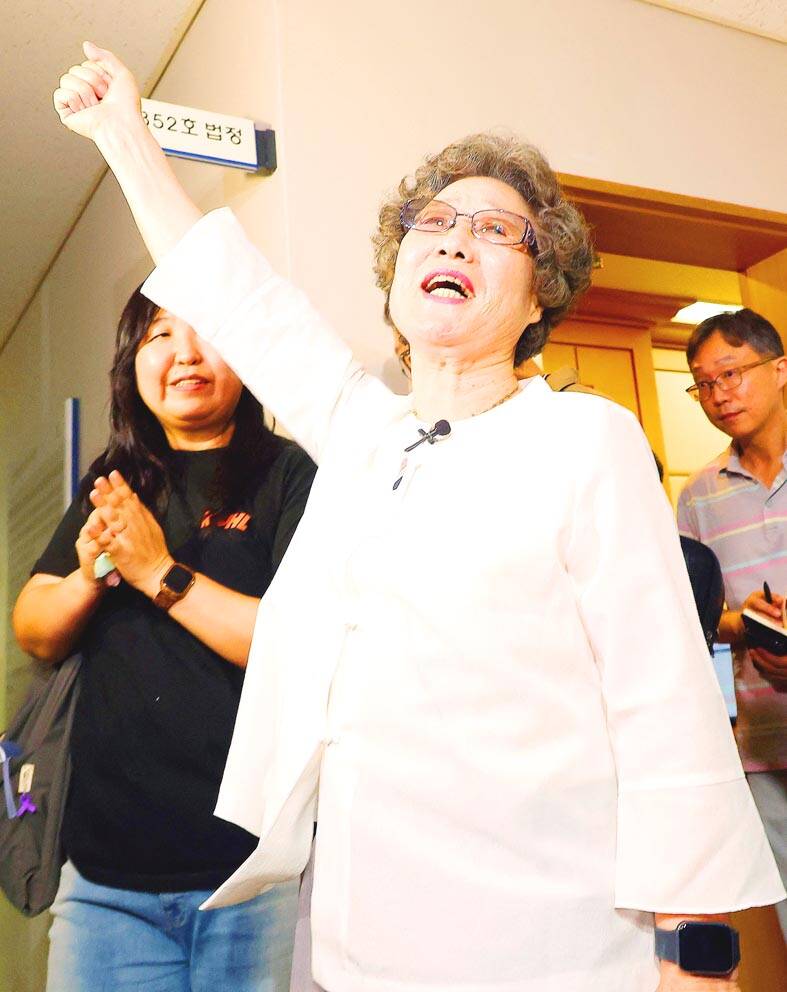A South Korean court yesterday reopened a decades-old case after a woman challenged her conviction for defending herself against sexual violence 61 years ago.
Choi Mal-ja was 19 when she was attacked by a 21-year-old man in the southern town of Gimhae in 1964.
He pinned her to the ground and forced his tongue into her mouth, court records showed.

Choi broke free by biting off about 1.5cm of his tongue.
In one of South Korea’s most contentious rulings on sexual violence, the aggressor received only six months in prison, suspended for two years, for trespassing and intimidation — but not attempted rape.
However, Choi was convicted of causing grievous bodily harm and handed a 10-month prison sentence, suspended for two years.
The court said at the time that her action had “exceeded the reasonable bounds of legally permissible self-defense.”
Choi’s case gained renewed momentum decades later after women’s rights protests.
Choi filed for a retrial in 2020, but lower courts initially rejected her petition.
After years of campaigning and an appeal, South Korea’s top court finally ordered a retrial last year.
“For 61 years, the state made me live as a criminal,” Choi told reporters outside the Busan District Court ahead of yesterday’s retrial hearing.
She said she hoped future generations could “live in a world free from sexual violence where they can enjoy human rights and a happy life.”
Choi Sun-hye, executive director of the Seoul-based Korea Women’s Hotline counselling center, which supported her case, told reporters that her decision was also meant to “become a source of strength for other victims of sexual violence and correct past wrongs.”
At the retrial hearing, the prosecution asked the court to clear her of the past conviction, the Busan District Court told reporters.
A verdict is expected in September.

Auschwitz survivor Eva Schloss, the stepsister of teenage diarist Anne Frank and a tireless educator about the horrors of the Holocaust, has died. She was 96. The Anne Frank Trust UK, of which Schloss was honorary president, said she died on Saturday in London, where she lived. Britain’s King Charles III said he was “privileged and proud” to have known Schloss, who cofounded the charitable trust to help young people challenge prejudice. “The horrors that she endured as a young woman are impossible to comprehend and yet she devoted the rest of her life to overcoming hatred and prejudice, promoting kindness, courage, understanding

Tens of thousands of Filipino Catholics yesterday twirled white cloths and chanted “Viva, viva,” as a centuries-old statue of Jesus Christ was paraded through the streets of Manila in the nation’s biggest annual religious event. The day-long procession began before dawn, with barefoot volunteers pulling the heavy carriage through narrow streets where the devout waited in hopes of touching the icon, believed to hold miraculous powers. Thousands of police were deployed to manage crowds that officials believe could number in the millions by the time the statue reaches its home in central Manila’s Quiapo church around midnight. More than 800 people had sought

DENIAL: Pyongyang said a South Korean drone filmed unspecified areas in a North Korean border town, but Seoul said it did not operate drones on the dates it cited North Korea’s military accused South Korea of flying drones across the border between the nations this week, yesterday warning that the South would face consequences for its “unpardonable hysteria.” Seoul quickly denied the accusation, but the development is likely to further dim prospects for its efforts to restore ties with Pyongyang. North Korean forces used special electronic warfare assets on Sunday to bring down a South Korean drone flying over North Korea’s border town. The drone was equipped with two cameras that filmed unspecified areas, the General Staff of the North Korean People’s Army said in a statement. South Korea infiltrated another drone

Cambodia’s government on Wednesday said that it had arrested and extradited to China a tycoon who has been accused of running a huge online scam operation. The Cambodian Ministry of the Interior said that Prince Holding Group chairman Chen Zhi (陳志) and two other Chinese citizens were arrested and extradited on Tuesday at the request of Chinese authorities. Chen formerly had dual nationality, but his Cambodian citizenship was revoked last month, the ministry said. US prosecutors in October last year brought conspiracy charges against Chen, alleging that he had been the mastermind behind a multinational cyberfraud network, used his other businesses to launder